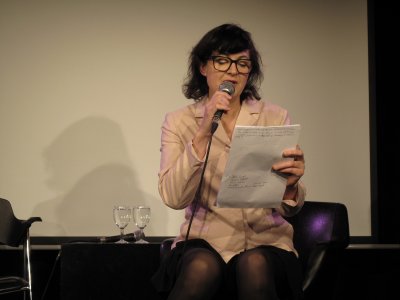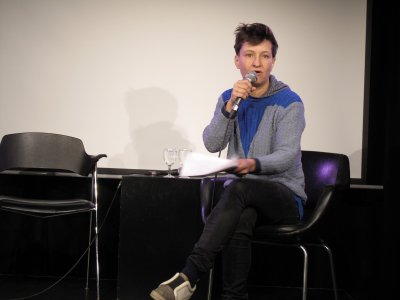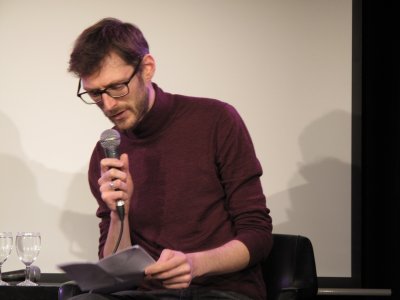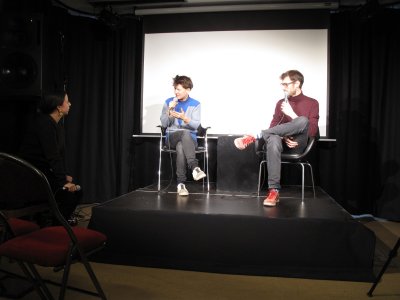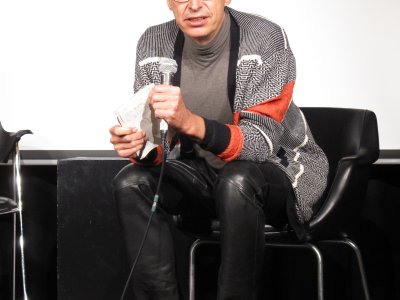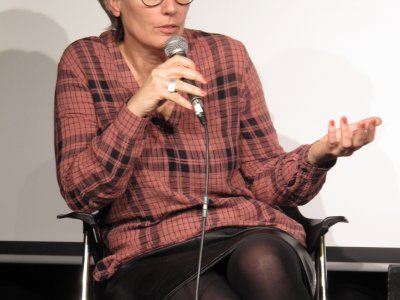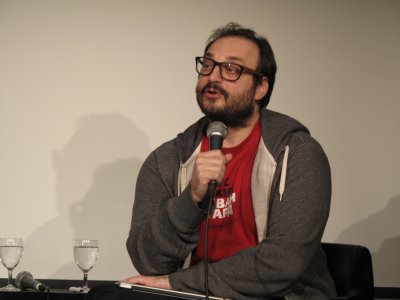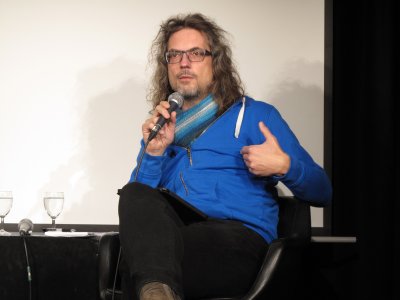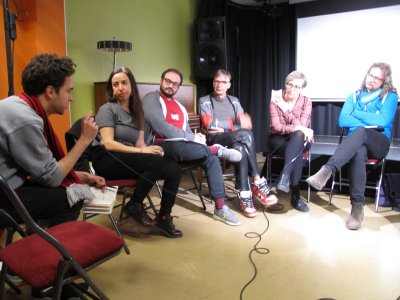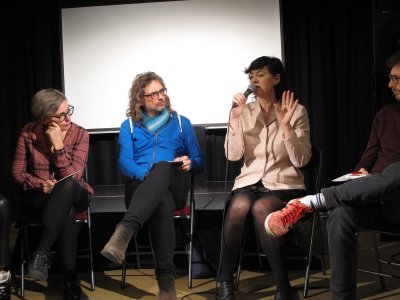from split sheets to the streets: how we credit, share and collect for intellectual property today and tomorrow
Initiated by the artist in residency Melissa Logan, this one-day symposium and reflection day examined the worlds of intellectual property and ownership of music - beginning from the present and extending into models for the future. It aimed at dissecting and reconstructing ideas of copyright, the distribution and monetisation of intellectual property, and at analysing formats for appropriation. It bringed together experts from diverse sides of the copyright universe from practical publishing to sharing culture thinkers, artists and philosophers.
Copyright as ownership of intellectual property is a burning issue in the dissemination of music, since its reproducibility. Already in 1936 however, Walter Benjamin observed that precisely this reproducibility also “brush[ed] aside a number of outmoded concepts, such as creativity and genius, eternal value and mystery”. Still, these concepts seem to form the basis of copy right law and practices today, thus creating a vacuum between thought and practice in which companies see possibilities to change intellectual property into commodity. By means of diving into philosophical and practical issues, we might understand better how to fill this vacuum with a more positive alternative, appropriate for the actual creators of music.
The symposium took place in AB Salon Brussels on November 24th 2018 and was a collaboration between Melissa E. Logan (UniCAT - University of Craft Action Thought / Chicks on Speed) and Q-O2 workspace, in the framework of an artistic project by Logan. The event was organized in parallel with the participatory art residencies of Interfaces Network. Read more about the residencies here.
With:
Christian von Borries (conductor, composer, filmmaker and producer)
Dr. Prodromos Tsiavos (Head of Digital Policy and Development, Onassis Group)
Femke Snelting (Constant, working with Free Software, feminisms and authorship)
Matthias Hornschuh (composer, publicist, authors rights activist)
Melissa E. Logan (UniCAT - University of Craft Action Thought/Chicks on Speed)
ooooo (constellatie, performer, activist)
Dr. Yoni Van Den Eede (Postdoctoral Fellow and Assistant Research Professor Vrije Universiteit Brussel)
Moderator: Tamar Shafrir (writer and researcher)
Programme:
Christian von Borries: "Media determine our situation"
We have to start thinking technologies of distribution, content identification and surveillance as being part of content itself. This talk includes a survey from early hip hop to today’s music production by christian von borries.
Dr. Prodromos Tsiavos: "Between the Commons and the Platform Economy: towards an IPR model for the arts in the 21st century"
This talk will focus on different forms of value production on platforms (social media, streaming services, sharing economy) and the implications they have in terms of the intellectual property management models most appropriate for the production of different kind of value. Following a three tier flow model (value, rights, content) we explore how intellectual property licensing schemes are combined with Service Agreements and data management plans in order to support the business and distribution models of different artists.
Femke Snelting: "Authors of the future"
Conventional copyright law places authors and their hybrid contemporary practices in a framework of ownership and possession. Creations are by default conceived as original and individual works, making collective, networked practices difficult to fit. Within that legal and ideological framework, Open Content Licenses such as Creative Commons and the Free Art Licence introduce a different perspective. These “legal hacks” on copyright allow artists to re-imagine authorship as an entangled, geneological and generative practice. But what are the limits of that imaginary?
Matthias Hornschuh: "About Authorship & Authors Rights"
Being an author in the digital era is complicated. Because being an author is and always was complicated. Nothing new. What‘s new then? 1. The gate keepers. 2. The narrative of free. 3. The solidarity between authors, artists, and their respective partners, United in their fight for survival. Time for a more holistic approach; time for a change!
Melissa E. Logan
Melissa E. Logan is focusing on copyright during her November residency with Q-O2. The work will open into this symposium From Split Sheets to the Streets – on intellectual property and copy right – Melissa E. Logan & UniCAT. Logans interest in copyright grew from a hoarding of her and collaborators creative output. This hoarding has been going on for the past six years and before that she was suffering from a feeling of worthlessness in regards to her musical output. This feeling of worthlessness came about from the distribution process and the non transparency of the business side of the music world. Through conversations she found the different relationships artists have with distribution, sharing, iTunes/Spotify. Some artists said “hay, at least iTunes works, it functions” (Malakoff Kovalski). Or others who release short versions of songs onto Spotify, the real versions are sold on Vinyl to DJs or as digital download from sites which actually pay the artists (DJ Aroma & her ambient /house label). Still Logan could not release the music: there was not a satisfactory label structure, we need the label now mostly for marketing and as a production/management organization, or what do we need it for?
Logan took a music business strategy course at Berklee Collage of Music and found most of the course to be on the worlds of copyright, that many of the laws are outdated and based on technology which are irrelevant to digitization. As articles 11&13 were cleared for passage by the EU Parliamentary vote, to go from a directive to become integrated into each European country to be made law, the symposium has gained in urgency as a chance to understand our copyright, the laws about our creative output, our rights and our payment, shares.
ooooo
Sourcetracking enclosure of the commons: 'who owns what' or 'are we talking about responsibility?' Intellectual property is the regulatory structure of the knowledge economy in the contemporary 'information' society. It exists to regulate rights to 'access' of ideas and information and in so doing, it inhibits the possibility of many to participate in the creation, innovation, and production of alternatives. How can we contribute to civil society, share resources, and redistribute ideas, plans, stories, songs, compositions, critical reflections, practices, …? Ooooo posits that it is time to break from legislative structures rooted in ideas of ‘genius’ and ‘originality’ in order to allow for an autonomy of users/developers (DIWO*), and transition towards broader participation in creating culture countering repression and control. Intellectual property is the regulatory structure of the knowledge economy in the information society. It inhibits the right to access and hence to participate in the creation, innovation and production of alternatives. How to contribute to the civil society, share resources, and redistribute ideas, plans, stories, songs, compositions, ... as well as critical reflections and practices? It is time to break myths around geniality and originality and have user/developer autonomy (DIWO) and transition towards broader participation in creating culture countering repression and control. (*do-it-with-others)
Dr. Yoni Van Den Eede
Technology and Art in the Global Village This contribution takes the general perspective of philosophy of technology and in particular the work of Marshall McLuhan as entry points for thinking about intellectual property. In random order, McLuhan’s insights on the blurring boundaries between humans and technologies, the global village, tribality, the evolution of media through time, and work and education can serve as springboards for (re)evaluating artistic and cultural production and consumption in the 21st century. One central thread throughout all this concerns the purported “human” prerogative when it comes to making and appreciating art – this at least needs to be reassessed in the light of contemporary technological developments.
Brussels, Belgium

